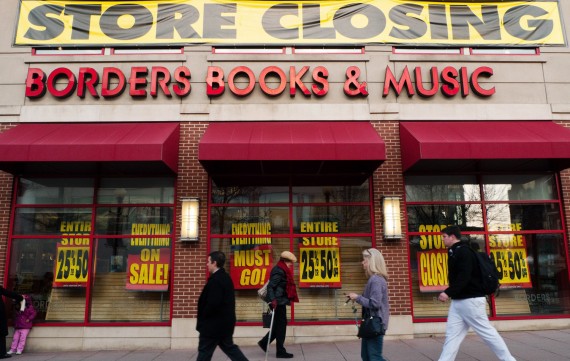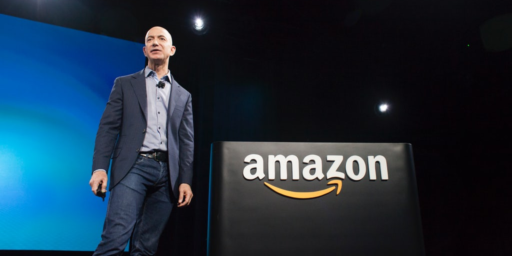Capitalism, Creative Destruction, And The End Of Borders Books
Borders Books is closing, because the free market works.
The liquidation and eventual shuttering of the 40-odd year Borders Books chain, which became official with a Bankruptcy Court filing yesterday and a liquidation sale that started at all Border’s locations today has led to much reflection and commentary across the blogosphere, as well as a some disagreement as to whether the cause of Borders’ destruction can be attributed to the free market, or something else.
Anthony Gregory at The Independent Institute sees the end of Borders as an example of the triumph of the market:
For the consumers, the downfall of Borders is glorious, much as was its climb to success. In the rearrangement of resources to serve customers we see the beautiful actions of the market economy reconfiguring the world to provide the goods and services that are most wanted and needed in the most effective way. To ignore the upside to Borders’ downfall is as fallacious as to focus only on the downside of its upswing, as did most of the anti-corporate left in the last decade. But today we see that it was not government, nor socialist agitation, that brought the axe down on this big company. It was the matrix of demand provided by customers. It was the consumer base, acting in a manner much more democratic in the good sense of the word, and much more peaceful and socially productive, than anything we see in the political process. Thank goodness there is no doctrine of “too big to fail” in the book store industries. If the government bailed out Borders as it has so many financial institutions, surely the customers would suffer.
(…)
The failure of Borders is a beautiful thing, coming as it does from the market process. If voluntary competition should one day bring Amazon.com down, in the midst of a competing commercial success today unimaginable but even more friendly to consumers than that wonderful online store, we will again have reason to celebrate.
Daniel Larison objects, claiming that one of the reasons for Amazon’s success was related to the quirks in the law that allow it to conduct business without collecting sales taxes:
Amazon has flourished as much as it has thanks to the unfairness of being able to compete with physical bookstores without the burden of paying taxes to state authorities. It has gained at the expense of other firms by evading taxation that its competitors could not evade, and it has vigorously opposed attempts to subject it to the same rules. One man’s successful business model is another man’s example of gaming the system. Meanwhile, ten thousand Borders employees will have to find other work in a miserable labor market, and the book industry as a whole will suffer significantly from the loss of sales that will follow. If this is a “beautiful thing,” I’d hate to see what a disaster looks like.
First of all, I don’t think that Gregory was saying that it’s a good thing that those 11,000 people are going to lose their jobs, certainly it isn’t. However, there is something to be said for an economic system that rewards good and bad choices so starkly because, as I’ll discuss below, it’s fairly clear that the demise of Borders had little to do with sales taxes and everything to do with its own bad business decisions. Does the sales tax exemption give Amazon some advantage over its competitors? Probably it does, but that strikes me as being, at best, a minor part of the reason that Amazon has succeeded while Borders has failed.
Second, as Gregory already notes there’s plenty of evidence for the argument that government policies also contributed to Borders rise in the 90s:
There were ways in which government may have initially exaggerated the success of these stores. First there are the indirect subsidies that come with government planning, eminent domain, the quasi-socialized nature of strip-mall production, and so forth. More important, such establishments seemed to thrive in the real-estate and dotcom-related booms of the late 1990s and Bush era. The underlying cause of these booms, in my opinion, was credit expansion, directed by the Federal Reserve in large part with the deliberate goal of bringing about heightened economic activity, in the second case especially in real estate.
Yet whether or not the government had a role in pumping up Borders, it was the market that began signaling to the world that the company’s days were probably numbered. It is the force of the market that is bringing the business to its knees.
If Larison were correct that Amazon’s luxury of not having to collect sales taxes on book (and music) transactions were the main reason that it was able to out compete Borders, then that brings a number of questions to mind. How does the rise of Amazon explain the downfall of smaller and mid-size chains like B. Dalton, Crown, and Brendtano’s ? It doesn’t, of course, because for the most part, those chains, along with many independent bookstores were themselves the victims of the rise of the Borders and Barnes & Noble mega-stores in the 90s. And, speaksng of Barnes and Noble, why has this company managed to succeed where Borders has failed despite being tied down by the same bricks-and-mortar disadvantages, not to mention that evil sales tax? The answer, of course, is that the main reason that Borders failed is because they made a series of bad decisions that pretty much doomed them to their fate:
1. It made a fatal deal with Amazon
In 2001, Borders cut a deal with Jeff Bezos & Co. to have Amazon.com run its website, which may have been the beginning of the end, says Matt Townsend at Bloomberg. “I remember thinking this is the weirdest thing… and [that] it was the last thing we wanted to do,” says Manish Vyas, then a manager of Borders’ online unit. “It ended up being a customer-harvesting vehicle for Amazon.” Divorced from its online component, Borders continued to expand its brick-and-mortar locations until, finally in 2008, the bookseller debuted its own website. Too late: Amazon had already gobbled up a massive chunk of online market share and released the first Kindle.2. Borders made a losing bet on CDs and DVDs
Borders “went heavy into CD music sales and DVDs, just as the industry was going digital,” and “Barnes & Noble was pulling back,” says investment researcher Peter Wahlstrom, as quoted by NPR. Borders’ “big bet in merchandising” turned out to be a losing one. In 2006, CD and DVD sales generated $600 million in sales for Borders, 17 percent of its revenue, notes Townsend. By 2009, iTunes had taken over, and sales of CDs and DVDs at Borders had fallen by 28 percent.3. It jumped on the e-book train too late
Amazon released the first Kindle in 2007, while Barnes & Noble followed up the next year with its Nook e-reader. By the time Borders finally decided to get into the e-book biz, it was too far in the red to spend much money on devising a digital strategy. Instead, it outsourced the problem to Kobo Inc., a Canadian e-reader company, and started selling their wares in 2010. Just last week, Borders shops displayed a “great big table of Kobo readers,” says Harry McCracken at PC World. “But it was clearly far too little, far too late.”4. Borders built too many stores
Even “if e-books didn’t exist, I’m pretty positive that Borders would have still collapsed in much the same way,” says McCracken . “While Borders was busy giving the web and e-books short shrift, it was also doubling down on the notoriously tricky business of running brick-and-mortar superstores.” Late last year, I counted four Borders stores in San Francisco, and three were no more than a mile and a half apart. “I’m no retailing genius, but I couldn’t figure out how the city could support so many giant bookstores in so little space.” Barners & Noble, by comparison, has only one store in the city.
It wasn’t one wrong decision that doomed Borders really, but the combination of all of them that, put together and then combined with the bad economic of the past several years, made any chance that they’d continue to exist in their present form. The whole sales tax issue may have played a role in the process but, as Barnes & Noble shows us, that factor alone doesn’t have to create a competitive disadvantage if you make the right business decsision.
This is what Anthony Gregory means by the process being glorious. The market is a continuous system of signals sent to businessmen and consumers upon which they make decisions. When they make the wrong decisions, they suffer the consequnces and, if they make enough wrong decisions, the business will fail. It’s not a happy day when something like that happens, but it’s far better than allowing inefficient businesses to keep operating out of nostalgia or some other misplaced desire that results in resources being utilized ineffiiciently.
One final note about the closing of Borders. In their on the subject, David Weigel and Matthew Yglesias notes the social aspects of stores like Borders and the manner in which they encouraged browsing and just kind of haning out drinking coffee. I suppose it’s sad to see such a venue fade away. I used to do that myself back in the day, although it’s been quite a while since I’ve had either the time or the opportunity to spend endless amounts of time hanging out in a bookstore. To some extent, that social role is now fulfilled by Starbucks and similar locations that, mostly, encourage people to hang out during the day as long as you’re not unreasonable about it. But commercial space is expensive, especially in the urban areas where Weigel and Yglesias live, and I’m not sure that providing a place to chill to young single people is really the road to breaking even, never mind profits. In the end, it certainly wasn’t for Borders.







Wow. That sentence needs to be taken out and shot.
Sorry, you can’t just brush off the tax thing so easily. Yes, Borders may have been poorly run and made bad business decisions, but the question is would it be going out of business WITHOUT the competition of Amazon. If the answer to that is “yes”, then the tax thing doesn’t matter. If they answer to that is “no”, then the tax thing matters a whole heck of a lot.
And frankly, I always get a bit disgusted to see people raving about the creative destruction of the market from jobs that are largely insulated from that dynamic. The theoretically perfect economy such people praise where only the best and smartest companies survive would in reality be a brutal and barren place to try and live.
Mike
Barnes & Noble isn’t exactly doing well either – they’re just not doing as badly as Borders did, so using them as an example of how Amazon didn’t kill Borders is particularly unconvincing.
The sales tax excuse is pathetic. So, setting that aside . . .
They got beat by B&N. They got beat by Costco. They got beat by Amazon. They got beat by all things digital.
Amazon is the clear winner, but don’t count out B&N. B&N is pretty strong on digital but they are carrying around a lot of real estate, a lot of big box stores, that may not make sense for much longer. I expect Costco and Target to drop books within a couple of years.
Apple has been an under-performer — they can’t seem to get their online store together or find an edge on Amazon, despite far superior e-book reader technology.
It’s funny to think back that even a few years ago when I was writing wild Jeremiads to my publishers about the coming e-pocalypse I sounded like a crazy person. Not so crazy any more. I also warned them a few years ago (3 I think) that Amazon was going into publishing (they have) and that self-publishing would lose its stigma and eventually attract name authors (that’s under way) and that publishers needed to start thinking very hard about leveraging their cash and human capital to get into enhanced books. (That’s happening only by fits and starts, slowed paradoxically by the Kindle and the Nook, and by Apple’s slowness to capitalize.)
I hate to see Borders go. When they were good they were very good.
Capitalism isn’t exactly doing great things lately.
The closing of Borders represents failure…nothing else.
Amazon’s biggest advantage is that it runs a negative operating cycle, enabling them to crush everyone on price, tax or no tax. I would be very surprised if the few dollars in tax even enters the mind of most consumers, when they see the retail price itself being so much lower between Amazon and brick and mortar stores. I would be very curious how many people even realize they’re not paying sales tax at Amazon.
I actually think that the argument that Yglesias and Weigel were making speaks to the fact that if you look at things from a purely revenues/losses perspective, you ignore a lot of things that create genuine social utility but that are not capable of being easily monetized. The internet as a source of information, etc., is a great example. Creating a place where young people can hang around a lot of books and magazines is another. I would spend hours in Barnes and Noble in high school, and my actual purchases were probably worth a lot less than the utility I gained by browsing through books for a couple of hours. Who really knows, though, because those sorts of experiences don’t lend themselves to pricing.
It ended up being a squeeze play. Let’s divide books into two categories: Bestsellers and Everything Else.
If you want a Bestseller Costco will deep discount it and beat Borders.
If you want Everything Else Amazon has literally Everything Else. Plus discounted Bestsellers.
So if you’re Borders or B&N what have you got? You can’t carry as much of Everything Else as Amazon does because Amazon isn’t renting space at a mall, it’s a huge warehouse in the middle of a corn field. You can discout your Bestsellers, but you can’t go lower than Costco because no one can go lower than Costco. So what’s your advantage? Location. Unfortunately that location is very expensive so, Catch 22: your one asset is also your fatal weakness.
The answer is quite simple… The rent is too damn high.
Seriously, though, I hate sales tax and other user fee systems. It turns merchants and the service industry into tax collectors and it hobbles trade. I know this comment may disappear from negative comments after people read this, but it is much better to to tax (if taxes must be collected) income rather than production and trade.
Removing sales tax will encourage a higher volume of trade, encouraging competition and investment. Removing marginal taxes from those who would hardly notice the dent seem much less intrusive to the economy as a whole.
But what do I know? I hate economic theory to begin with. It is a science where all economic theories are valid yet none are provable. This gives me a headache.
What I do know is that I love bookstores. There is nothing like the sensory overload of walking into a bookstore. Every time I walk into a bookstore, I walk out with a book or two even though I had no intention of buying a book that day.
That new book smell… is like fresh baked cookies. And there is the weight of the book. The type. The paper. The art.
I have bought a few books online, sure. And there are other advantages to buying a book online in addition to saving on taxes: One can read reviews, look at similar titles from similar authors, and home delivery of course. And… Well, I better stop there for fear of writing a book about buying books.
I’ll close with this:
Here in Texas as with other states I know of, foodstuffs are sales tax exempt. To me, reading and education is just as important as a healthy breakfast, so perhaps we should make books tax exempt.
Food for thought.
Cheers.
@PogueMahone: There was a time in California when periodicals were exempt from sales tax, presumably on the belief that the availability of information was a general good. Then our voters were suckered into voting for a bill which, under the guise of protecting old ladies on fixed incomes, made sure that giant corporations paid property taxes based on a 1970s assessment. Money had to be raised elsewhere, and we got taxes on publications.
You know what’s really great and glorious? When a middle class person dies of cancer that could have been treating with early detection and sound medical care, simply because he couldn’t afford health insurance.
In this we see the beautiful actions of the market in all its glory. No government meddling here. Just the wonderful market choosing winners and losers based personal merit.
I think I prefer serial killers to libertarians.
@michael reynolds: “It ended up being a squeeze play.”
The argument, though, is that is was a squeeze play with the government also pushing on one side.
Mike
@MBunge:
B&N and Costco collect sales tax, too.
Amazon didn’t kill Borders all by themselves — Borders was a badly-managed company for many years. No one forced them to try and outbuild B&N or to plunge into DVDs and CDs at the wrong time or to give Amazon their online business or to fail to anticipate ebooks.
Even if you add the sales tax that you would normally pay for a book or DVD to Amazon’s prices, it is still cheaper than Border’s every day price. I only buy stuff at Border’s when I had a coupon from their “rewards” card or if I needed something immediately.
And I don’t know about other Border’s locations, but the one I would occasionally go to in Central Park in Fredericksburg, Virginia was a hipster hangout which featured some of the worst music I have ever heard it (terrible covers of great songs that made me want to drive a pen through my ears). The last time I was in there, the music was so bad that I just picked up what I was looking for and went straight to checkout without even browsing like I would normally do.
@michael reynolds:
Repeated because this is spot on analysis.
The tax issue didn’t kill Borders — at most it accelerated their demise. As Michael said, they over expanded, also moved into exactly the retail categories that would be most radically transformed by digital delivery.
The country/market can only support one bricks-and-mortar mega bookstore. As with many other things, the great possibility here is for a return of some sort of local bookstore/community hub. But it won’t be able to ever be on the scale of Borders again.
@michael reynolds: The problem is that all the brick-and-mortar chains have basically become libraries with coffee shops inside. If I know I want to buy a book, I simply go to Amazon and get it. The only reason I go to a B&N is to browse, especially for board books for my little girls. That gives me the ability to read the book before I buy it and, because I’ve got some discretionary income and am not I dick, I’ll actually pay the surplus and buy it there rather than simply ordering it from Amazon to save a buck or three.
When I was young and poor, I bought a lot of books from B&N through their catalogs and various chain stores from their discount racks. But, now, I mostly just buy it online.
@James Joyner: I have heard that Amazon sales may suffer because people went to browse at Borders and them went home an ordered from Amazon. That’s what I did except living here in Portland I went to Powell’s. I’m not a Kindle person – 65 you know – and I like reading in bed at night. For that I need a real book.
Rather sales tax did in Border or not would be a pretty simple thing to test. Oregon and some other states do not have sales tax. How did the Borders stores perform in states without sales tax? My guess is not any different than states with sales tax but I could be wrong.
Amazon is a very well run company. Their cloud services have revolutionized the internet biz making is very easy and cheap to scale web sites as your traffic increases.
They have idle capacity sitting around waiting for Christmas and a few specific product launches (they had to put in extra equipment every time a new Harry Potter book was released). Not only did they develop a cloud system that allowed them to add capacity and deal with hardware failures quickly but they also productized the idle capacity so they made money from it and at the same time revolutionized the ISP biz.
Brilliant. Seriously, fracking brilliant.
@James Joyner:
This is actually the vague, not-yet-practical advice I give Indie bookstores: they need a way to link that in-store browsing to e-book purchases. A store-identifier QR code that you shoot with your smart phone, for example. Let people make that impulse buy — right there, right then — in ebook with the split going to the store. And set up half a dozen iPad stations to show enhanced books.
The less vague advice I give is to specialize, to look at gift books, expensively bound books, coffee table books, learn to manage in-school events and author events, etc… The smart, agile Indies may survive.
But if the Indie Booksellers Association set up an online ordering system along the lines I outlined above, that might help all of them. It’s still easier to browse books in a store and stumble on something or be guided by a knowledgeable staff person.
One interesting technology is to print books on demand. Basically, they are hardcopy ebooks. A small store could have the same ‘inventory’ as Amazon. I wonder how that would change the economic equations.
@Jib: Or compare it to Washington, where we do pay sales tax for Amazon. The fact is that Amazon has better selection, more information, better pricing and a better return policy than Borders, and Borders devoted 1/3 of their stores to music and DVD which is basically dead in the brick and mortar stores.
@Argon:
E-readers are already better than paper books for some purposes (e.g. reading mass-market or genre fiction), and they are going to get better.
Outside of children’s and other specialty books (books with a lot of graphics, etc), it’s likely that hardcopy books will become a small niche market, like vinyl records.
This is the future of the brick & mortar bookstore:
http://www.usatoday.com/money/industries/retail/2011-02-25-vinyl25_ST_N.htm
Something controversial:
Borders is another example of the ‘mee too’ slow responsiveness, timidity, and lack of innovation by midwest based firms. I’ve been tracking this problem for some time but I can’t really put any good data together on it. The tendency for the ‘middle to ride on experiments of the coasts’ is pretty clear. But the question is ‘why?’ Why are middle american (great lakes) companies slower to innovate and respond to demand than their coastal or Texan counterparts? Is it something in the water (or the snow?) 🙂
The future is electronic. Books will be for collectors. They’re heavy, Expensive to produce. And speculative to produce. Books are a commodity. There is no value in their distribution. There is no value in their format. There is no value in the printing process. The value is in the abstract content that they can deliver, and that abstract content is well delivered in electronic form.
The entire capital structure of the book industry is being creatively destroyed. We havre been paying for the distribution of a good, not it’s contents. Electronically delivered, we are paying for it’s contents, and not it’s distribution.
Tax critics are ridiculous and counter-factual. There is a very high penalty that an internet company pays for the fact that you can’t touch it’s products, and because you have to WAIT for them to arrive. Amazon provided a service, at no cost, which was that customer reviews of books made it easier to buy something that cannot be judge except by consuming it (judging a book by it’s cover is impossible). Amazon made it possible to research and select books that might be appealing to you.
The shipping and time costs outweigh the tax costs.
Amazon provided a better service. In fact, it provided a moral service to the entire economy. It provided transparency: ‘labeling’ on the goods it delivered and a means of compensating for the ignorance of sales people and the opacity of knowledge about products that is endemic in the anonymous retail environment. Furthermore, Amazon creates a moral benefit by compensating for the deception of marketing and advertising.
I think your printing costs would be prohibitive & I don’t see how you could even approach the quality of the look & feel of a contemporary paperback printing on the fly.
@michael reynolds: Amazon didn’t kill Borders all by themselves
Who says it did? It’s entirely possible Borders would have eventually gone out of business no matter what the sales tax status of Amazon. That still doesn’t disprove or even dispute the contention that the sales tax issue had something to do with Borders economic demise by imposing unfair competition upon it.
Mike
@Curt Doolittle: The future is electronic.
Which will be a future where you don’t actually own your books or anything else. You’ll just think you do until somebody decides to show you otherwise.
Mike
@anjin-san: If you’re talking about indy bookstores with their own printing machines, I think you’re right, at least for the forseeable future. However, print-on-demand has come a really, really long way, and I wouldn’t be surprised if copying and printing places started offering it.